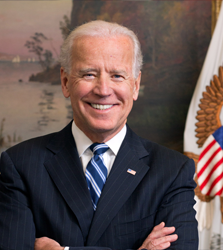
Still Waiting on Biden
Summer has come and gone, but Vice President Joe Biden still has yet to declare his intentions for the 2016 presidential race despite his earlier pledge to decide by the end of the summer. Some have pointed to the first Democratic debate, scheduled for Oct. 13, as the true “drop dead” date for Biden to decide, while others suggest he can wait longer, perhaps even until after the Iowa caucuses and New Hampshire primary. According to The New York Times, debate host CNN will keep a spot open for Biden until the very last minute should he declare on the 13th:
Joe Biden Eligible for October Debate — if He Declares
Vice President Joseph R. Biden Jr. has an open invitation to participate in the first Democratic presidential debate next month.
According to criteria released by CNN, the network that is hosting the debate on Oct. 13, Mr. Biden would have until the next day to file a statement of candidacy with the Federal Election Commission. The rules apply to any prospective candidate who is polling higher than 1 percent….
Although the debate criteria are not explicitly designed to accommodate Mr. Biden, they leave him with leeway to draw out his decision over a run to the middle of next month without missing the opportunity to take part in the first formal gathering of the Democratic candidates.
While Biden does not have to decide until the day of the first debate to participate, his allies and supporters aren’t waiting. Politico reported this morning on his team’s efforts to woo former Massachusetts Gov. Deval Patrick:
Massachusetts supporters of Joe Biden are seeking to forge an alliance between the vice president and former Bay State Gov. Deval Patrick, a close friend of President Barack Obama and prominent African-American leader whose support could open pathways to the state's potent Democratic donor network….
Patrick has been a rare prominent Democrat to criticize Clinton’s air of “inevitability,” warning repeatedly that the absence of a serious competition for the Democratic presidential nomination could alienate voters, comments that have irked Clinton loyalists. His continued fence-sitting in the primary has fueled rumors — taken seriously by some Massachusetts Democrats, but dismissed outside the state — that he could be Biden’s running mate if the vice president decides to run for president.
More significantly, prominent members of Patrick’s political network have shown little interest in lining up behind Clinton. Some have gravitated, for now, toward former Maryland Gov. Martin O’Malley, who’s gained no traction in the race so far. That leaves large untapped pockets of potential support for Biden.
The importance of a Patrick endorsement of Biden, should he run, isn’t limited to funding, according to the article:
Patrick is a significant prize in a state viewed as the ideological hub of Democratic politics — and a state whose other elite political leaders have also been on the sidelines of the presidential primary, from Sens. Elizabeth Warren and Ed Markey to Boston Mayor Marty Walsh. Walsh is joining Clinton next week at a Boston event on opiate addiction, and he reportedly fielded a call from Biden in recent weeks. Warren, meanwhile, met privately with Biden as he began laying the groundwork for a possible bid, and she has also met with Clinton.
But Patrick is uniquely positioned to influence the Democratic primary. His close relationship with Obama would give his endorsement the appearance of the president’s tacit support. And his historic tenure in office — he was just the second elected African-American governor in the nation’s history — gives him a powerful voice in the black community. Biden has engendered goodwill among black leaders for his loyal support of Obama, but Clinton has racked up a slew of endorsements from members of the Congressional Black Caucus and been counting on energetic support from black voters, who play a critical role in Democratic politics.
The lack of support from the black community for Vermont Sen. Bernie Sanders has led some to suggest he has little chance of ultimately prevailing over former Secretary of State Hillary Clinton. Should Biden enter the race, it’s possible he could seriously cut into Clinton’s lead with this crucial Democratic constituency. A struggle between Biden and Clinton for black voters wouldn’t just have a huge impact on which of the two of them wins the Democratic nomination; it could also create an opening for Sanders by minimizing his shortcomings with black voters (assuming it persists).
The Biden decision could turn out to be the single most important factor in who gets the Democratic nomination, with a “no” decision effectively handing it to Clinton and a “yes” creating a three-way battle that could last well into next spring. Even if it isn’t the most important factor, it’s likely to end up as among the most consequential.



